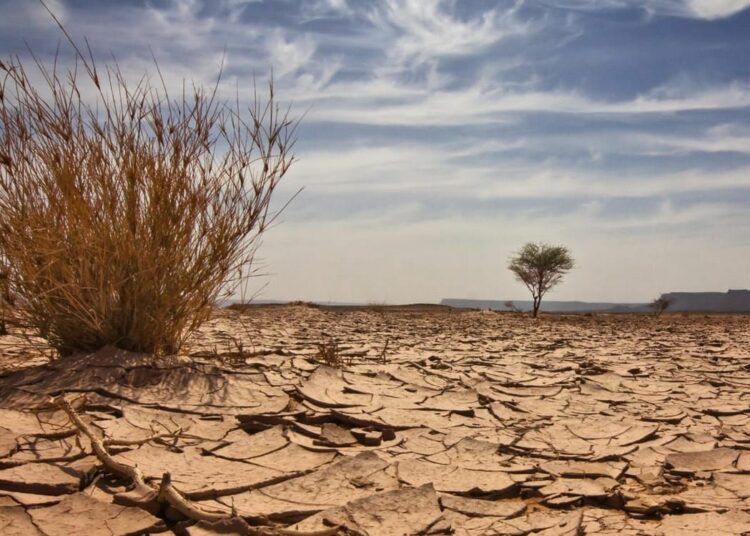Given Nigeria’s extensive geographical range—from the arid north to the tropical south—it is particularly susceptible to climate-related disturbances. The consequences are extensive, with significant repercussions for both current and future populations.
The health ramifications of climate change in Nigeria are critical and complex. The 2022 World Health Day, aptly themed “Our Planet, Our Health,” highlights the interconnectedness of environmental conditions and human health, as both non-communicable and infectious diseases rise in tandem with increasing climate-related challenges.
According to the World Health Organisation (WHO), climate change is already influencing health in numerous ways, contributing to illness and fatalities due to rising temperatures, escalating sea levels, fluctuating rainfall patterns, and more frequent and severe extreme weather events. The need for immediate action to mitigate these impacts has never been more urgent.
The WHO estimates over 13 million avoidable deaths annually due to environmental causes, including climate change.
WHO deputy country representative, Alexander Chimbaru highlights its negative effects on air and water quality, food security, and habitat, exacerbating non-communicable diseases (NCDs) in Africa. Nigeria’s former ministe of state for health, Dr. Olorunnimbe Mamora, emphasied that environmental crises worsen health issues, particularly impacting vulnerable populations like the elderly, low-income communities, and those with pre-existing conditions. The urgent need for addressing these interconnected health and environmental challenges is critical for improving public health outcomes.
He said that the environmental crisis has led to worsening non-communicable diseases, enhancing an ecosystem where various infectious diseases foster, worsening air quality, food and water shortages, and deteriorating mental health illness.
Mamora said it primarily affect the vulnerable and the elderly populations disproportionately, especially low-income communities, minorities, children, and individuals with existing health conditions.
Quoting WHO statistics, the former minister said that approximately 80 percent of climate change affects many children. It also impacts access to healthcare delivery services and disrupts primary health care infrastructure, involving healthcare utilities, ambulatory care services, and communication systems, which are all critical to maintaining emergency medical treatment services.
A public health expert, Dr. Rufai Alami, noted that rising temperatures, changing precipitation patterns, and increased frequency of extreme weather events such as floods and droughts exacerbate the spread of diseases, particularly vector-borne diseases like malaria and dengue fever.
According to him, higher temperatures expand the habitat of mosquitoes, leading to an increased incidence of these diseases in regions where they were previously uncommon.
Moreover, climate-induced disasters like floods contribute to water contamination and the spread of water-borne diseases such as cholera, diarrhea, and typhoid. Prolonged heat waves and poor air quality, especially in urban centers like Lagos and Abuja, have also been linked to respiratory diseases and heat-related illnesses.
Extreme weather events have overwhelmed Nigeria’s fragile healthcare system, straining its ability to cope with the rising demand for medical services and infrastructure, especially in rural areas where access to healthcare is already limited.
Environment
Nigeria’s environment is increasingly facing degradation due to climate change. The northern regions have experienced more frequent droughts, resulting in desertification, soil erosion, and a shrinking Lake Chad Basin. These changes have severely impacted livelihoods that depend on the lake, such as fishing and farming.
In coastal areas, rising sea levels and flooding have led to erosion, saltwater intrusion, and habitat loss for both human communities and wildlife.
The Niger Delta, one of Nigeria’s most ecologically important regions, is particularly at risk. It faces challenges from oil spills, deforestation, and coastal erosion, all worsened by climate change. This environmental degradation disrupts ecosystems, diminishes biodiversity, and threatens agricultural productivity.
Deforestation rates are rising, driven by agricultural expansion and illegal logging, and are further intensified by changing climatic conditions. This makes the environment more susceptible to floods and landslides, especially during the rainy season.
Like many other countries, Nigeria is grappling with the devastating impacts of climate change, including extreme weather events and ecological disruptions, said the minister of state for Environmental, Dr. Iziaq Salako.
He said climate change poses an existential threat to Nigeria, thus the need for comprehensive, sustainable, and innovative solutions.
“As we confront these challenges, we must recognise that addressing climate change is not solely an environmental concern. It is an economic, social, and moral imperative that demands coordinated and collective action,” Iziaq added.
However, he expressed the federal government’s commitment to addressing climate change and promoting sustainable climate finance and working towards the Nationally Determined Contributions (NDCs) and the global climate goals set out in the Paris Agreement.
“As we strive to meet these targets, we need the support and active involvement of all stakeholders, including the private sector, civil society organizations, and the international community,” he said.
Agriculture
Agriculture is the backbone of Nigeria’s economy, employing over 60 per cent of the population, particularly in rural areas. However, climate change poses a significant threat to this vital sector.
Unpredictable rainfall patterns have disrupted planting and harvesting seasons, leading to reduced crop yields and increased food insecurity. In the northern regions, prolonged and severe droughts have resulted in poor crop performance and livestock losses. Key crops such as maize, sorghum, and millet, which rely on consistent rainfall, have been especially hard hit. Meanwhile, the southern and central regions, which depend more on river irrigation and rain-fed agriculture, are facing floods and extreme weather that wash away crops and farmland.
For example, in Edo State, farmers struggle to predict rainfall, impacting their productivity. Mr. Ebosetale Oare, a farmer from Idoa, shared his frustration over last year’s poor harvest due to altered rain patterns: “Before, the rain normally started in February or March, but now we may wait until April without any rain, and it can end earlier than expected. We can’t plan our farming anymore, and it’s affecting us.”
Additionally, pests and diseases that thrive in warmer, wetter conditions are becoming more widespread. As climate unpredictability increases, many farmers are forced to adapt or abandon agriculture altogether, with some opting to migrate as a survival strategy.
Economic Impact
Climate change presents a growing economic challenge for Nigeria. Agriculture contributes about 25 per cent of the nation’s GDP and has been severely impacted by climate variability, resulting in lower productivity and revenue. The country’s heavy reliance on oil exports, which are also threatened by environmental changes in the Niger Delta, further complicates economic stability.
Severe weather events—such as floods and droughts—have inflicted significant economic losses, damaging infrastructure like roads, bridges, and homes. This increases the financial burden on the government, which often has to redirect funds to disaster recovery efforts.
The economic repercussions extend to livelihoods as well. Decreased agricultural yields drive up food prices, leading to inflation that disproportionately affects low-income families already facing food insecurity. Climate-induced migration from northern regions to southern cities adds further strain on urban resources and infrastructure, intensifying economic pressures.
The interconnected impacts of climate change on health, the environment, agriculture, and the economy in Nigeria are profound. Addressing these challenges requires a comprehensive strategy that includes investments in climate-resilient infrastructure, sustainable agricultural practices, improved healthcare systems, and policies aimed at reducing greenhouse gas emissions.
To safeguard its people, environment, and economy from the escalating effects of climate change, Nigeria must strengthen its adaptation and mitigation efforts. The nation’s ability to respond effectively will be crucial for its future prosperity and well-being.





